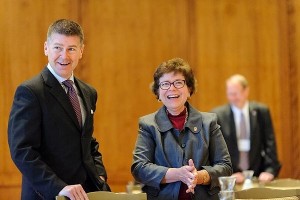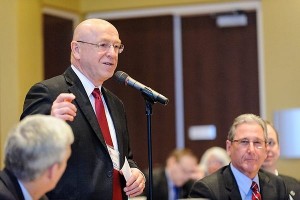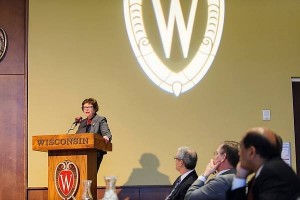MADISON – The Board of Regents’ Business and Finance Committee and Audit Committee today reviewed University of Wisconsin System’s audited annual financial report for the fiscal year that ended June 30, 2013. Discussion focused on changes to the report, year-end cash balances, and how those assets affect the academic accreditation of individual colleges and universities.
Interim Vice President for Finance Steve Wildeck reported that the System’s universities, colleges, and extension units took in nearly $5.1 billion last year, representing an increase of $189.9 million (3.9 percent) in revenue. Total expenses were nearly $4.6 billion – a $94.5 million (2.1 percent) increase over 2012. The report includes an unmodified or “clean” audit opinion from the Legislative Audit Bureau.
- UW System PowerPoint, “2013 Annual Financial Report”
While adhering to rigorous accounting standards, UW System wanted to provide transparent, readable information, so the 2013 financial report adds more detailed notes about program revenue. Previous reports only showed UW System’s overall “net position” – the difference between assets and liabilities. The report now shows specific funding sources, such as tuition, gifts, and federal aid.
Associate Vice President Julie Gordon highlighted new details about unrestricted net assets, shown on page 54 of the annual report. That aspect of the System’s overall net position grew from $860.2 million in fiscal year 2012 to $1.08 billion in fiscal year 2013. The largest factors in this $219.5-million increase were:
- $95.4 million from tuition
- $29.9 million from general operations, including, for example, remedial education and businesses such as Babcock creamery
- $21.9 million from auxiliary operations such as residence halls, bookstores, and other self-supporting operations.
UW officials announced in July that the fiscal year 2013 balances would show increases over the previous year. Individual UW institutions hold most of those assets, many of which are committed for specific purposes.
Gordon stressed that the financial statements discussed today do not reflect significant impacts of the 2013-15 biennial state budget, which called for a two-year tuition freeze and required UW System to use $114.1 million in cash to cover ongoing costs and budget reductions. The state budget also required that UW use $88.5 million in cash to fund one-time initiatives and transfers to other agencies.
Regents in October approved a new policy on program revenue balances and reserves, to ensure that funds are monitored and reported more consistently. That policy, which must be approved by legislators, requires that UW Chancellors justify year-end balances exceeding 15% of annual expenditures, showing specific purposes and timeframes.
As part of the day’s presentation, UW officials looked at how cash balances are used as one measure of institution’s fiscal health. As part of maintaining their academic accreditation, colleges and universities must certify that they have adequate resources to support current and future educational programs.
UW System financial statements are prepared in accordance with Generally Accepted Accounting Principles (GAAP) as prescribed by the Governmental Accounting Standards Board. The statements are audited by the Legislative Audit Bureau, and also appear, in a somewhat modified format, in the State of Wisconsin’s Comprehensive Annual Financial Report (CAFR).
Annual financial reports from the past 14 fiscal years are available on the Annual Financial Reports page of the Financial Administration website.
Review of HRS audit findings
Responding to a Legislative Audit Bureau (LAB) report released earlier in the week that recommended changes UW should make to increase security and improve operation of its human resources system, Senior Vice President David Miller told members of the Business and Finance Committee that UW has already completed over 60% of the identified security measures. He added that remaining separation of duties controls will be completed by mid-2014.
- See
Regent Gerald Whitburn said the fact that security has been identified as a material weakness for three years is “most troubling and concerning.”
Larry Henderson, director of the Service Center, said a plan is in place to address LAB’s concerns, including closing access to HRS and implementing additional separations of duties.
Another area of concern previously identified by LAB was state group health insurance overpayments. In the most recent audit, LAB noted that such overpayments had declined from $12.6 million over the period from May 2011 to April 2012, to $1.2 million in the subsequent year ending April 2013 – a 90.5% decrease. Miller also noted that UW has remained current in reconciliations within the two-month recovery period since October 2012.
LAB’s report also indicated that overpayments for the Wisconsin Retirement System (WRS) had declined by 89.7% — from $17.5 million in 2011 to $1.8 million in 2012. Miller said UW has set a benchmark target of $250,000 for a maximum recoverable variance annually.
Whitburn said he was grateful for the progress made to date, and looked forward to such time as it could be moved to the “done pile.”
2015-17 Biennial Budget Process
David Miller, UW System’s Senior Vice President for Finance and Administration, and his team led a comprehensive presentation of the 2015-17 biennial budget process.
“The biennial budget is a puzzle with a lot of pieces,” he said. “The challenge is you can’t see the full picture until the puzzle is actually put together.”
UW’s budget planning is further complicated, he said, by some areas – such as student financial aid or compensation requests – operating on timelines that are not in synch with the deadlines UW must meet.
- See UW System PowerPoint, “ “
Regent Tim Higgins expressed his appreciation for the in-depth explanation of the process, and noted that it should assist the Board with its future budget deliberations.
Host UW-Madison showcases campus highlights
UW-Madison Chancellor Rebecca Blank presented the full Board with an overview of the state of the university in the first meeting hosted by the campus since she took over leadership in July.
Blank said the Regents should consider allowing UW-Madison to raise tuition in professional schools, as well as tuition on out-of-state students.
Tuition for professional schools is well below that of the school’s Big 10 and national peers, Blank said. For instance, out of 24 American Association of Universities schools, UW-Madison’s law school ranks 22nd in tuition resident tuition. The medical school also ranks 22nd out of 24, the veterinary school last out of 11 schools, and pharmacy school 17th out of 19.
The prices do not reflect the value of the degrees, and drain resources from other programs, Blank said.
“I am actually subsidizing the professional schools from other revenues,” Blank said. “It is not a competitive advantage to be the cheapest school available.”
Changes also should be made to non-resident undergraduate tuition, Blank said. As with graduate programs, UW-Madison is far below its Big 10 peers in this area, Blank noted.
“I agree we need to keep resident tuition affordable to the people of this state,” she said. “But out of state, we should be charging the market rate.”
Along with any increases, Blank noted, the university would need to increase financial aid to out-of-state students of need.
Blank went on to highlight UW-Madison’s educational innovation initiatives, and told the Regents that Wisconsin should be at the forefront of using of new technologies to deliver education more broadly.
“One of my goals looking forward is to put Wisconsin on the map and show how we can use these tools to improve education at a big public institution,” Blank said.
While making courses more accessible, the challenge is to also improve the quality of the classes, she said. Blank reported that UW-Madison has seen promising results from innovations like flipped classrooms, where students watch lectures at home online and engage in problem-solving exercises with peers in class, and that distance learning technology also holds great possibility, she said.
“Distance learning is a real system-wide opportunity for all of us in the system to work together on delivering degrees because we would no longer be tied to geography,” Blank said.
The university has also seen an enthusiastic response to its MOOCs, Massive Open Online Courses. While there are some flaws with the non-credit courses, including high drop-out rates, Blank said MOOCs are an effective branding tool that has the potential to highlight the outstanding instruction offered at UW-Madison to learners around the globe.
Blank updated the Regents on several campus building projects, including the soon-to-be completed Signe Skott Cooper Hall, which provides badly needed instructional space to the Nursing School. She also provided details of the ongoing Memorial Union renovation, the proposed Rec Sports renewal project, and the recent updates to campus housing facilities, which she called “a generational change and upgrade.”
The host campus also made presentations to various committees.
In the Research, Economic Development and Innovation Committee, Provost Paul DeLuca and agricultural science professor Mark Cook highlighted UW-Madison’s Discovery to Product (D2P) Igniter program. The entrepreneurial effort is funded in part by a UW System Economic Development Incentive Grant.
“In the process of creating knowledge, innovation pops out,” Cook said, adding that D2P will help move innovations and inventions “off the shelf” and into the marketplace. DeLuca noted that if even one out of five ventures advances, “it will be a roaring success.”
- See the UW-Madison PowerPoint, “ ”
In the Capital Planning and Budget Committee, William Elvey, associate vice chancellor for facilities planning and management, presented Regents with a progress report on UW-Madison’s 2005 Master Plan and an overview of the Recreational Sports Facilities Master Plan.
- See the UW-Madison PowerPoint, “ ”
In the Education Committee, Provost Paul M. DeLuca, Jr. led a presentation on “Educational Innovations and Updates from UW-Madison.”
- See the UW-Madison PowerPoint, “ ”
Committee Business
Business and Finance Committee
The Business and Finance Committee received a report on additional compensation received by UW System faculty and staff in FY2012 and FY2013 outside the state-approved pay plan. A total of about 30% of all staff received base adjustments during this two-year period. UW chancellors reallocated approximately $19 million in FY2012 to fund these base adjustments. In FY2013, reallocations of approximately $34 million were made for this purpose.
UW chancellors also reallocated one-time resources of approximately $18.6 million in FY2012 to fund one-time, lump sum payments, and approximately $23.7 million in FY2013. Lump sum payments are non-base building compensation for additional work of a one-time or non-recurring nature and are not to be construed as “bonuses.”
In other business, the Business and Finance Committee:
- Approved UW Colleges’ three-year contract for bookstore services with Neebo Complete College Outfitter;
- Approved the assignment of legal rights to a QEI trademark registered to the Board of Regents to Quality Educator Interactive, Inc.; and
- Approved a resolution noting the Board of Regents finds that potential conflicts of interest related to UW-Madison’s proposed contract with Intraband, Inc. and U.S. Navy are managed appropriately.
The Business and Finance Committee and the Audit Committee:
- Approved an Audit Plan for 2014.
Research, Economic Development and Innovation Committee
Federal Relations: Kris Andrews, UW System’s assistant vice president for federal relations, and Laila Robbins, assistant director of federal relations at UW-Madison, led a presentation on university priorities on the federal scene.
Andrews pointed out that more than 30 percent of UW System’s budget comes from federal sources – more than either tuition or state GPR. “Federal support touches each and every institution and program in the UW System,” she said. Top federal priorities at UW include promoting a robust system of federal financial aid and supporting federal research and development funding. “The threats are real and we have to be nimble,” Andrews said.
See the UW System PowerPoint, “ ”
WEDC: The Wisconsin Economic Development Corporation provided a program update and demonstrated its new interactive online-mapping initiative developed in conjunction with UW-Madison and UW-Whitewater.
View the Impact Map
Capital Planning and Budget Committee
The Capital Planning and Budget Committee:
- Approved UW-Madison’s request for authority to increase the budget of the Memorial Union Renovation-Phase II, Alumni Park project by $4.5 million Gift Funds and authority to construct the project for an estimated cost of $54.6 million;
- Approved UW-Madison’s request to convey the title of land parcels to University Research Park Inc.;
- Approved UW-Madison’s request for authority to construct the Camp Randall Stadium Information Technology Infrastructure Upgrade project at an estimated total cost of approximately $4.9 million;
- Approved UW-Madison’s request to pay a City of Madison municipal assessment for street and utility improvements on the 700 to 800 blocks of State Street and the immediately surrounding areas;
- Approved UW-Oshkosh’s request to accept a gift-in-kind of a new 38,099 GSF Alumni Welcome and Conference Center from the UW-Oshkosh Foundation and approved the expansion of the campus boundary;
- Approved UW-Whitewater’s request for authority to construct the Laurentide Hall Student Success Center Addition project for an estimated total cost of $4.5 million General Fund Supported Borrowing;
- Approved UW System’s request for two All Agency Maintenance and Repair projects with an estimated total cost of $3.7 million that will improve the safety of electrical equipment and renovate central utilities at UW-Madison; and
- Approved UW-Madison’s request for authority to increase the budget of the Hospital Ramp Expansion Project and construct the project for a revised total cost of $34.1 million.
Education Committee
The Education Committee:
- Approved the Bachelor of Science in Marketing at UW-Parkside;
- Approved the Bachelor of Science in Criminal Justice and Rehabilitation at UW-Stout; and
- Approved UW-Oshkosh’s and UW-Green Bay’s request for the dissolution of their collaborative Master of Social Work degree program, and approved their requests for an independent Master of Social Work program at each institution.
Photo credit: UW-Madison photographer Jeff Miller
See more photos from the meeting
###
The UW System Board of Regents will resume its meeting at 9 a.m., Feb. 7, 2014,
at Union South, UW-Madison.
Related: February 7 (day 2) news summary



